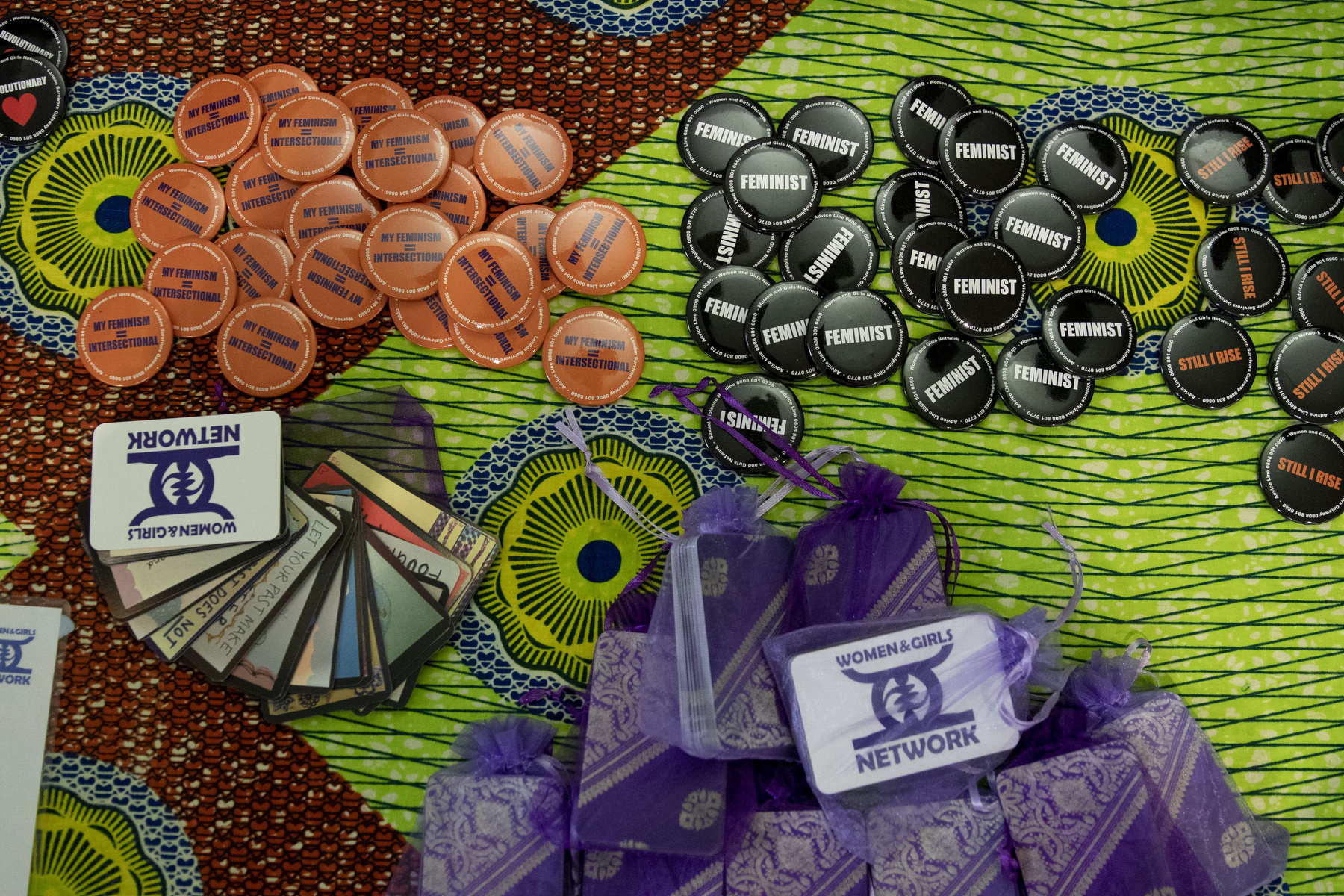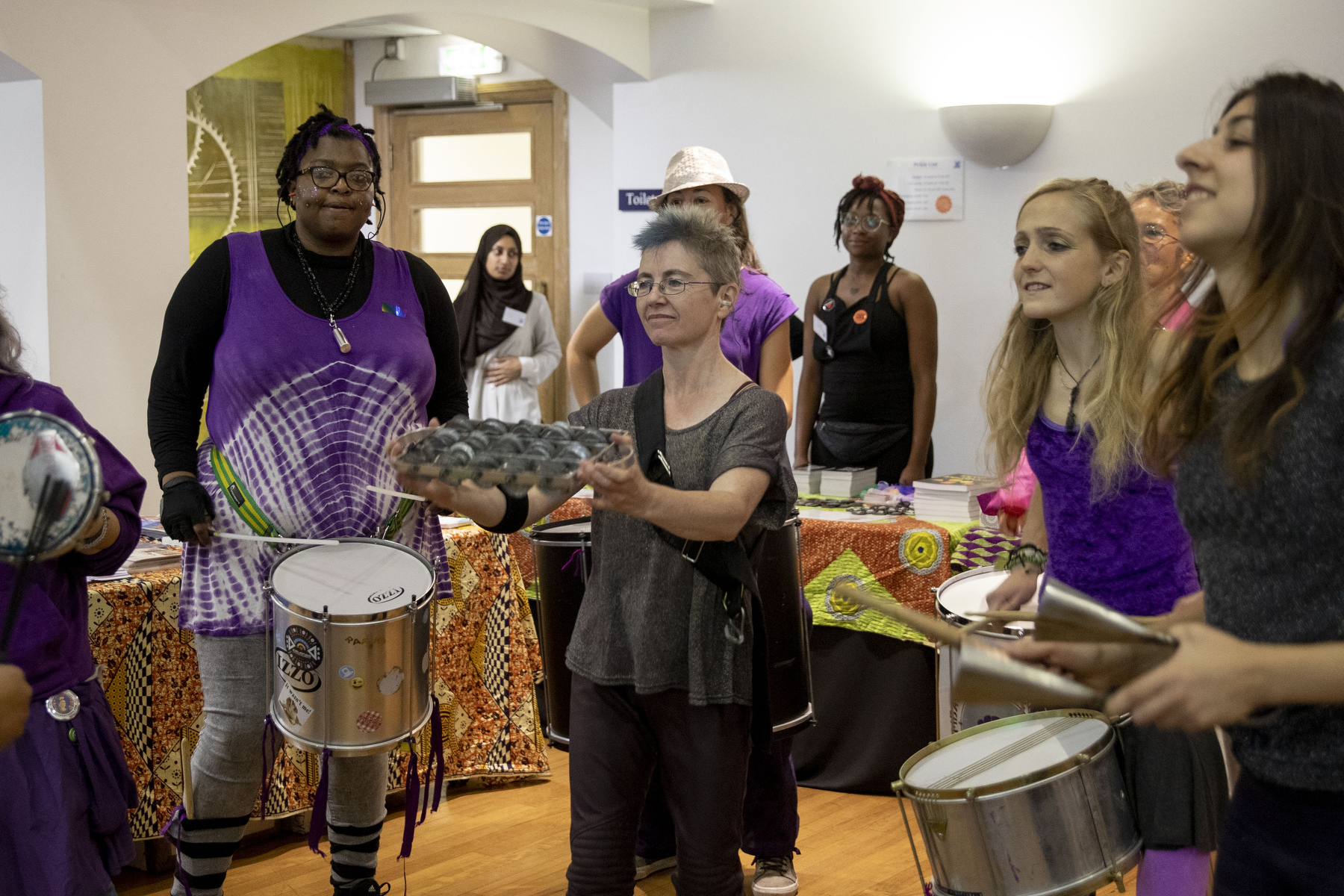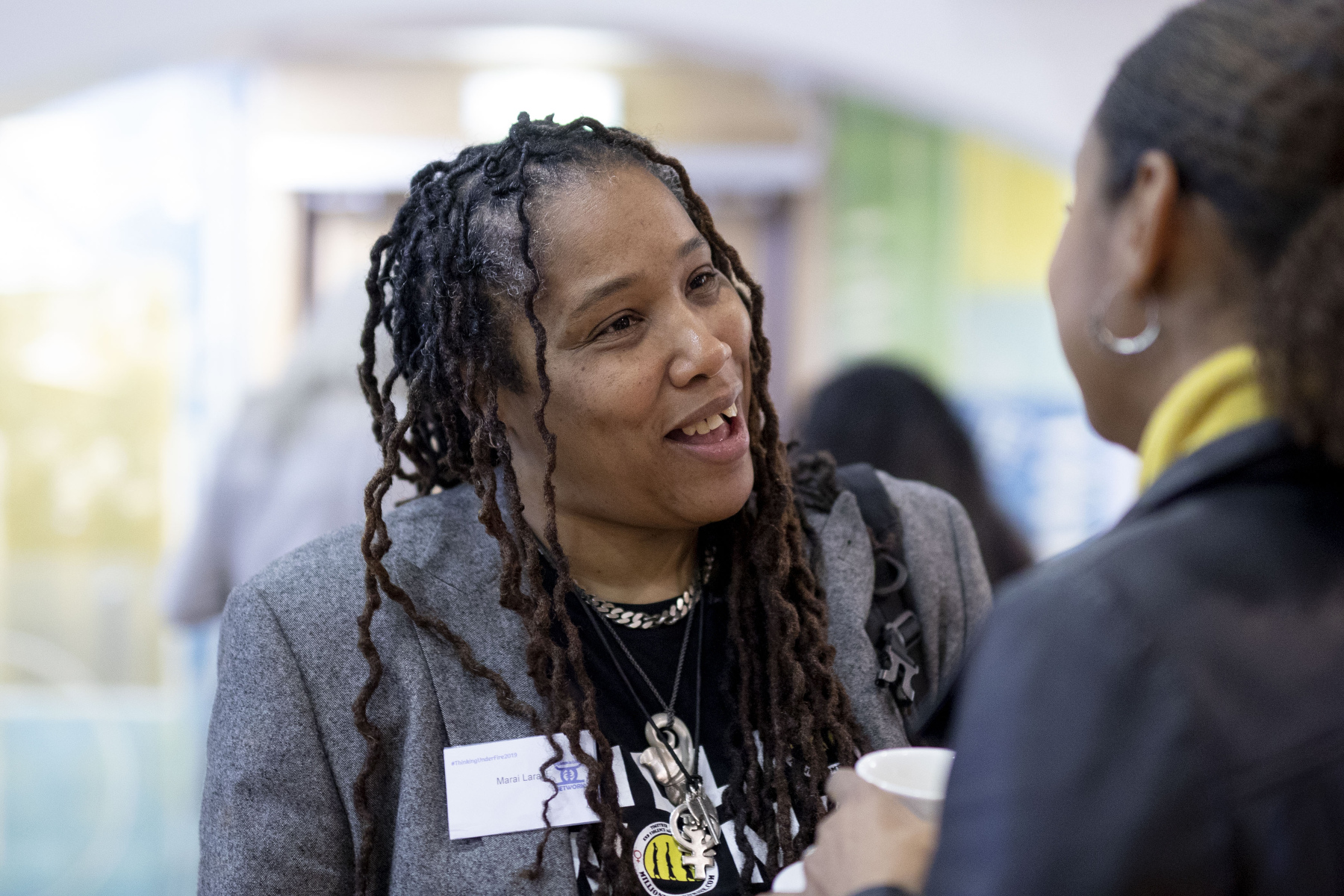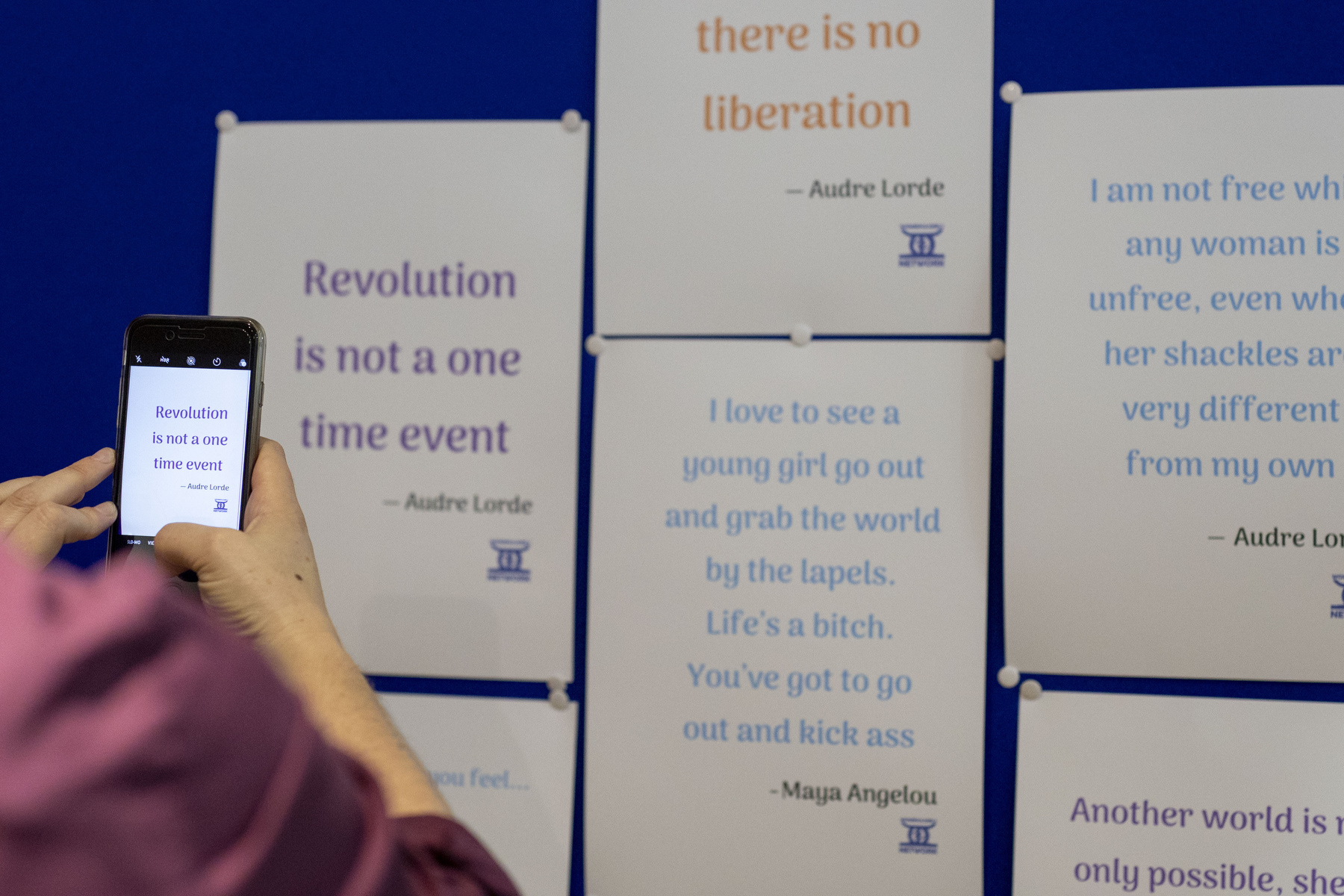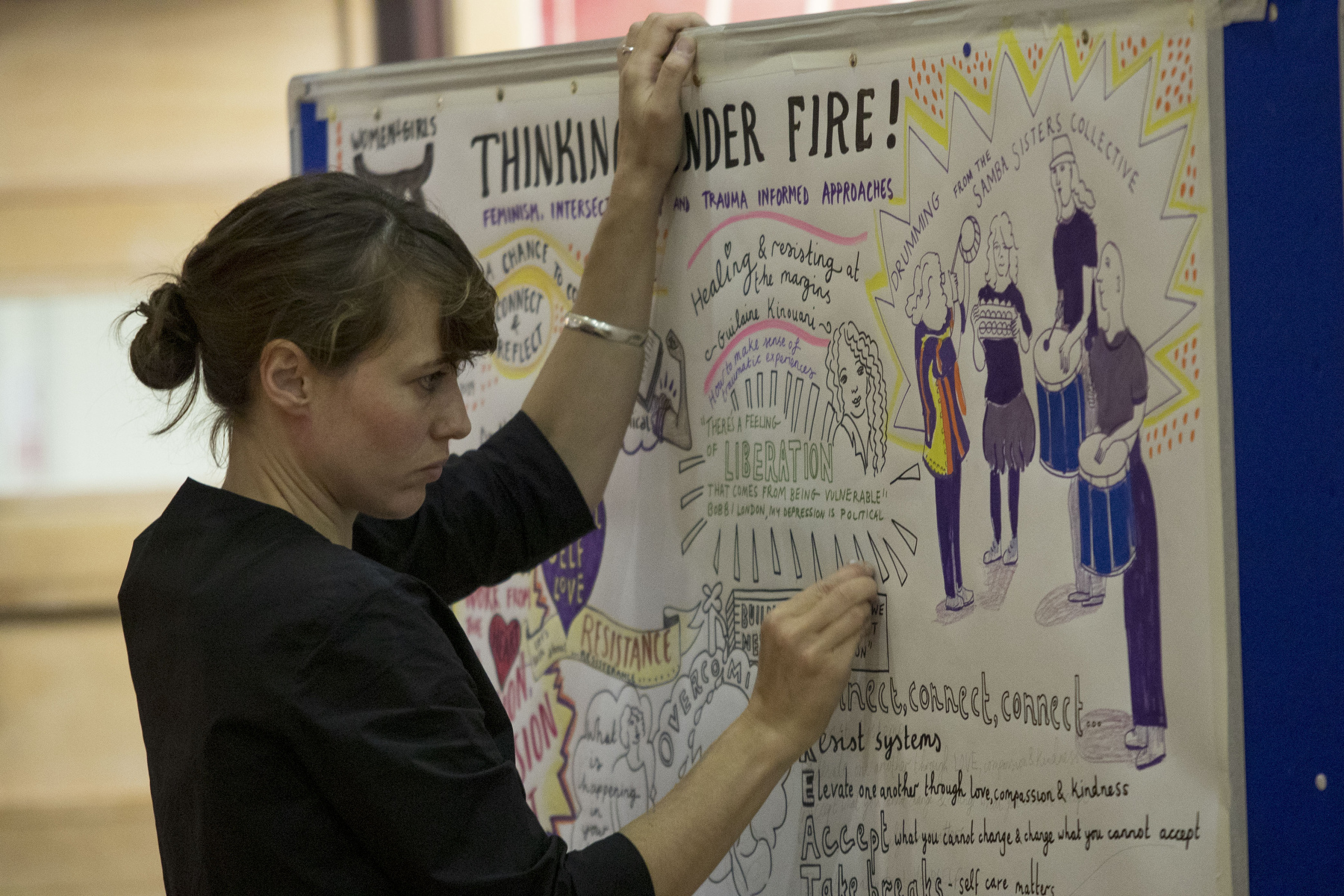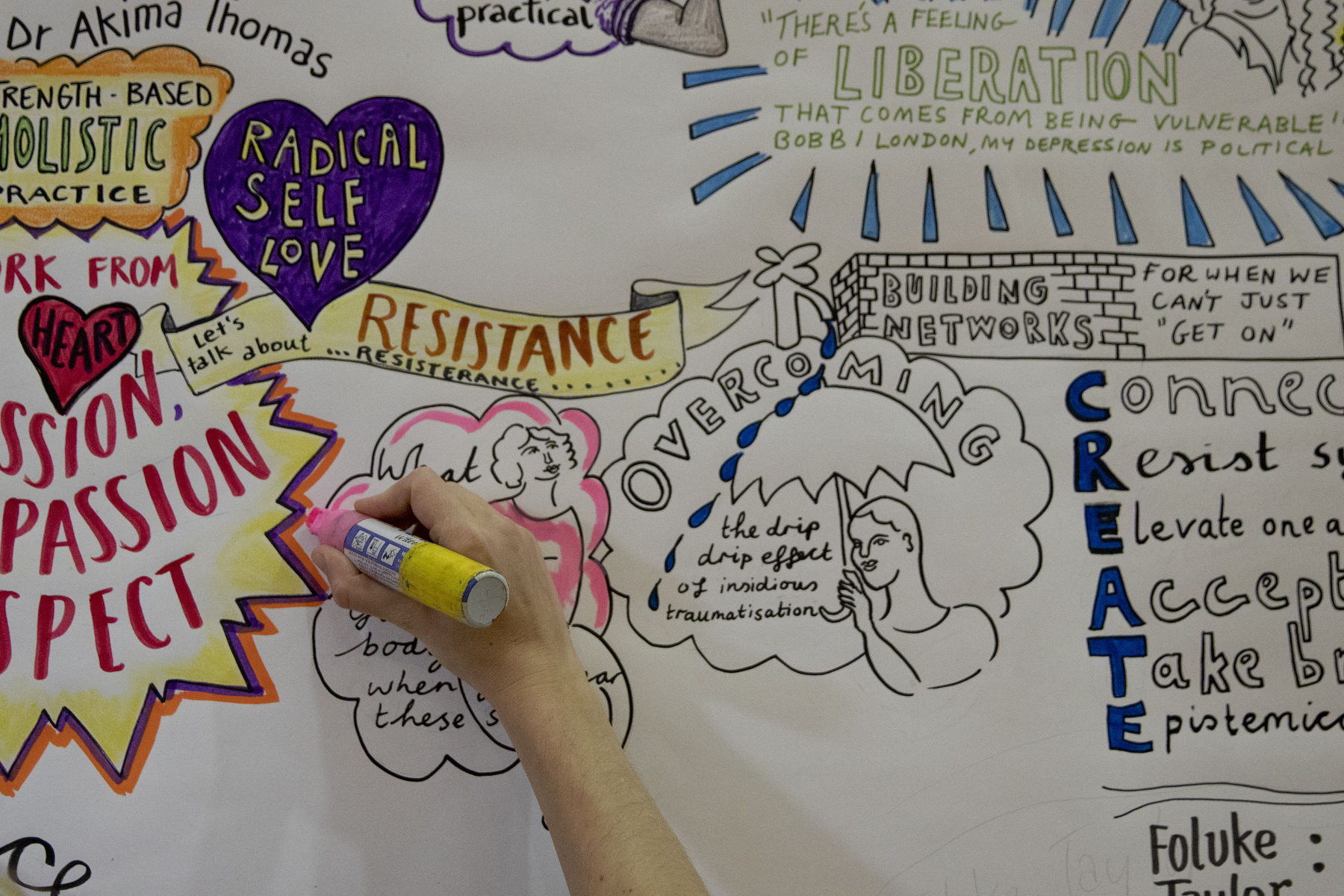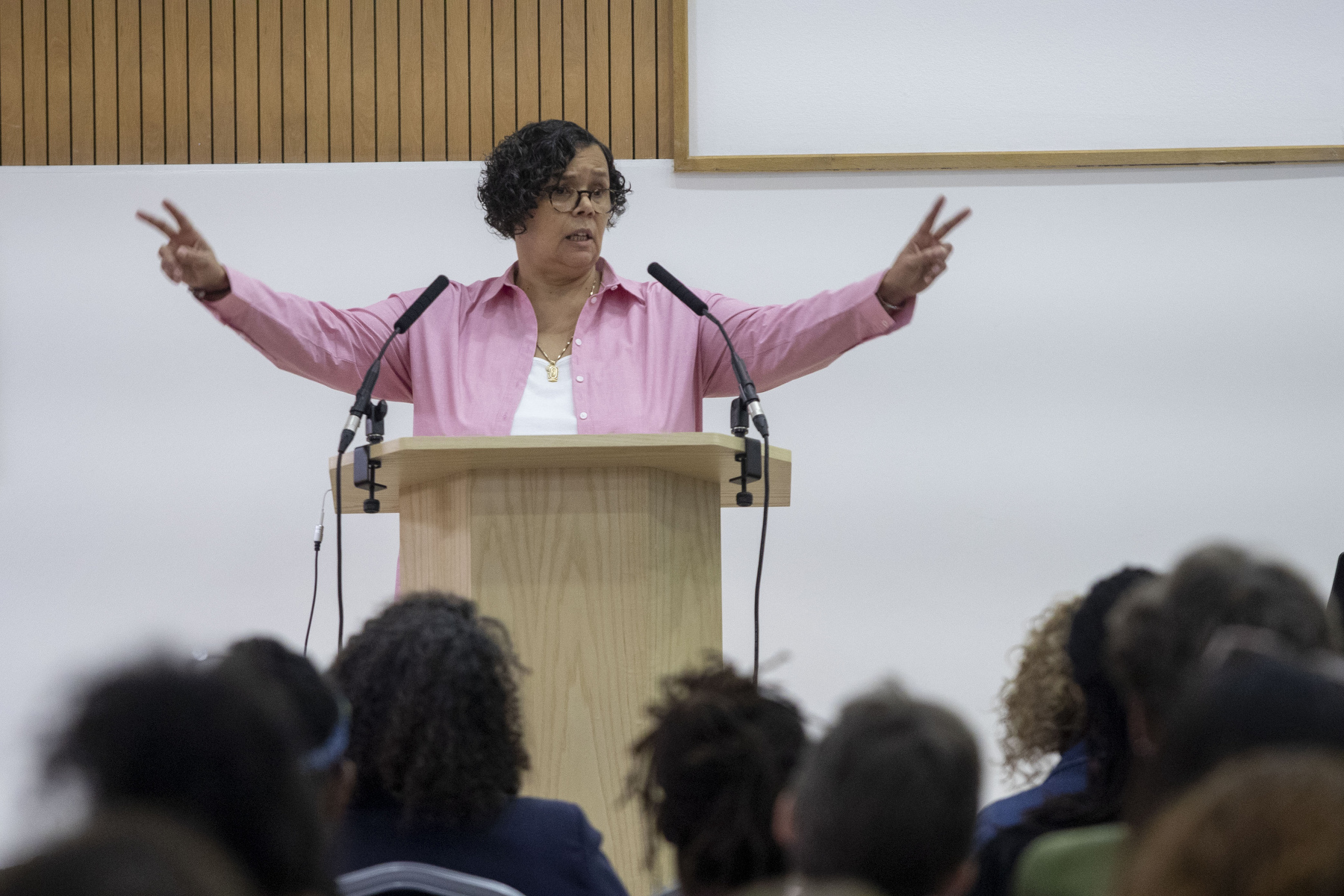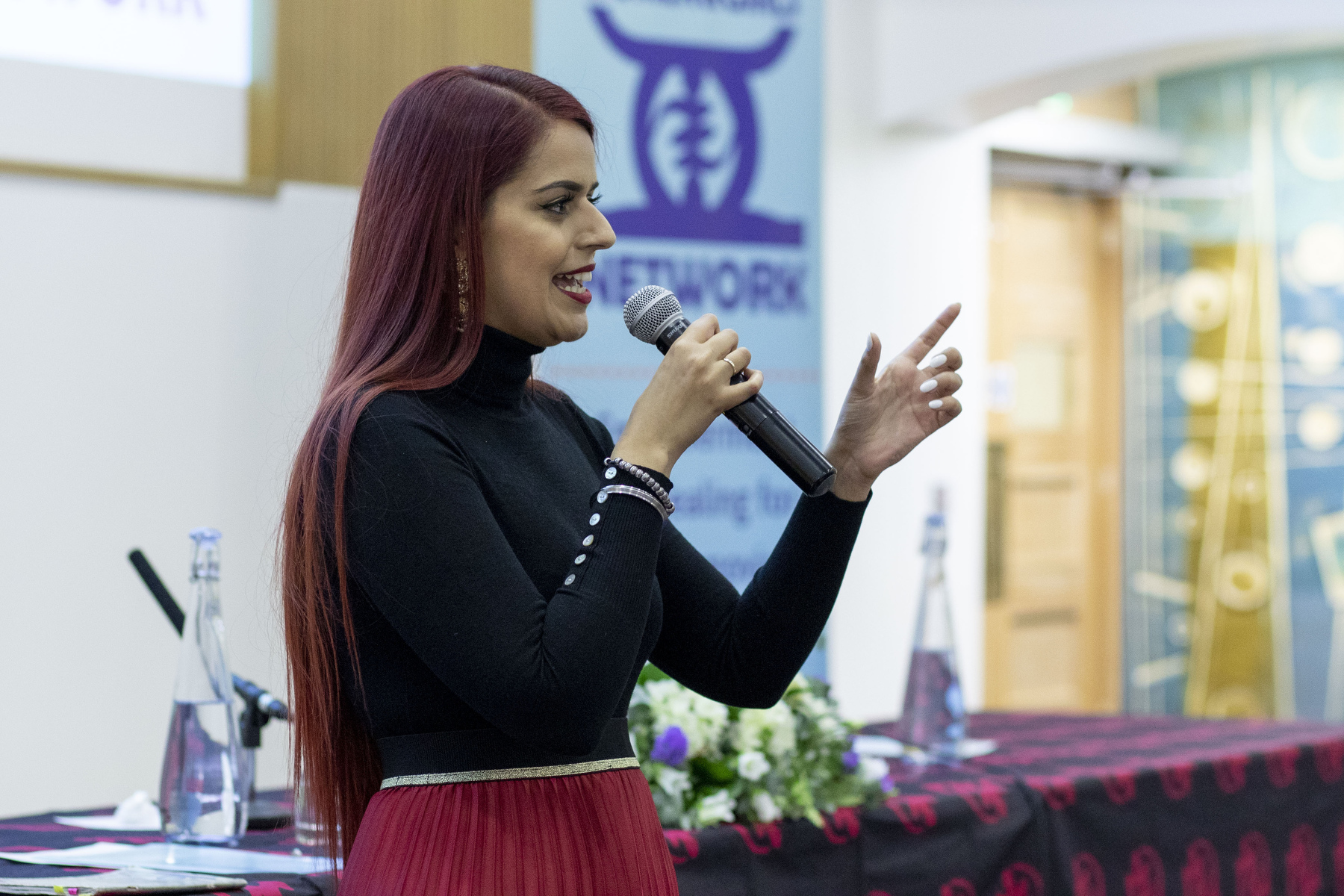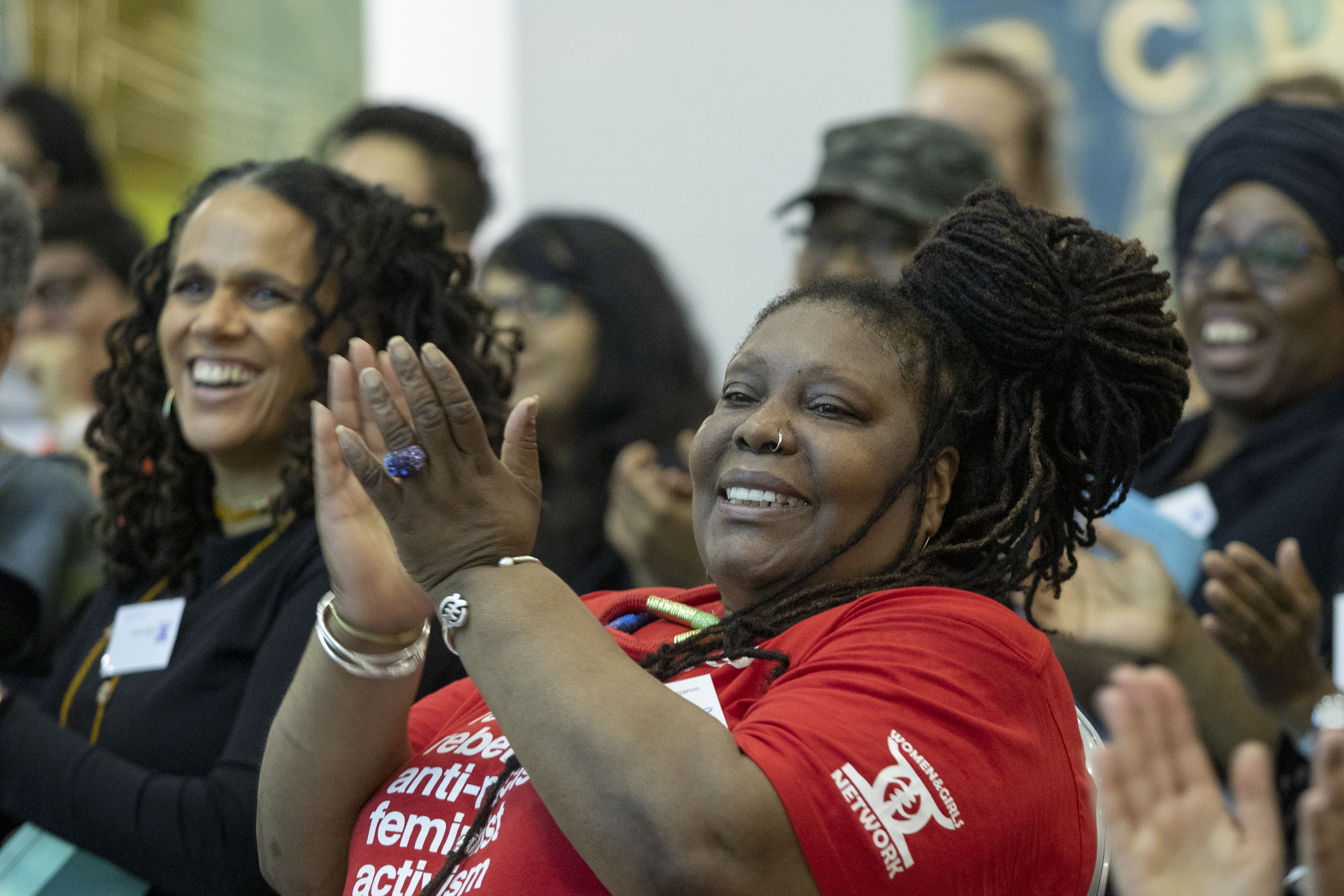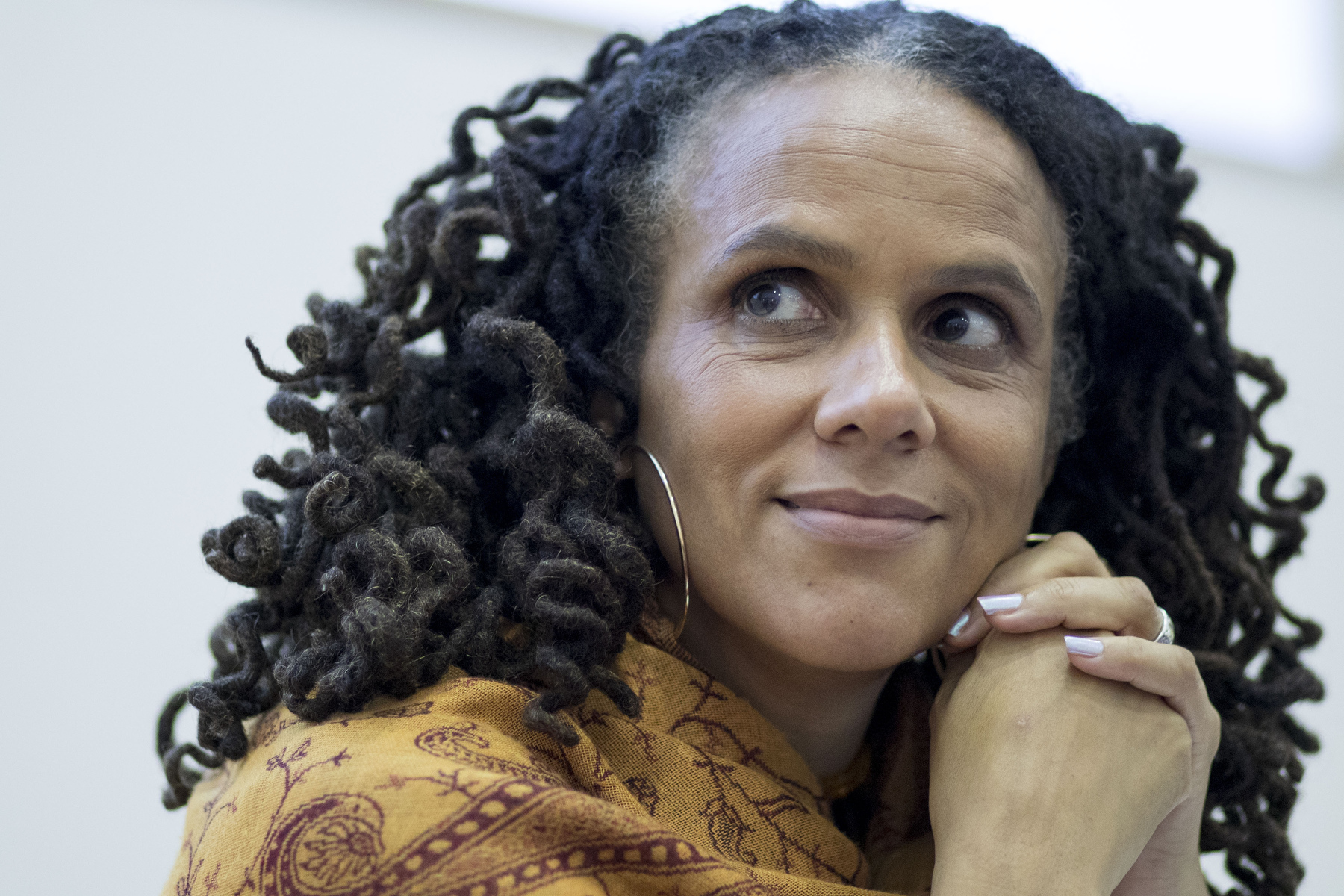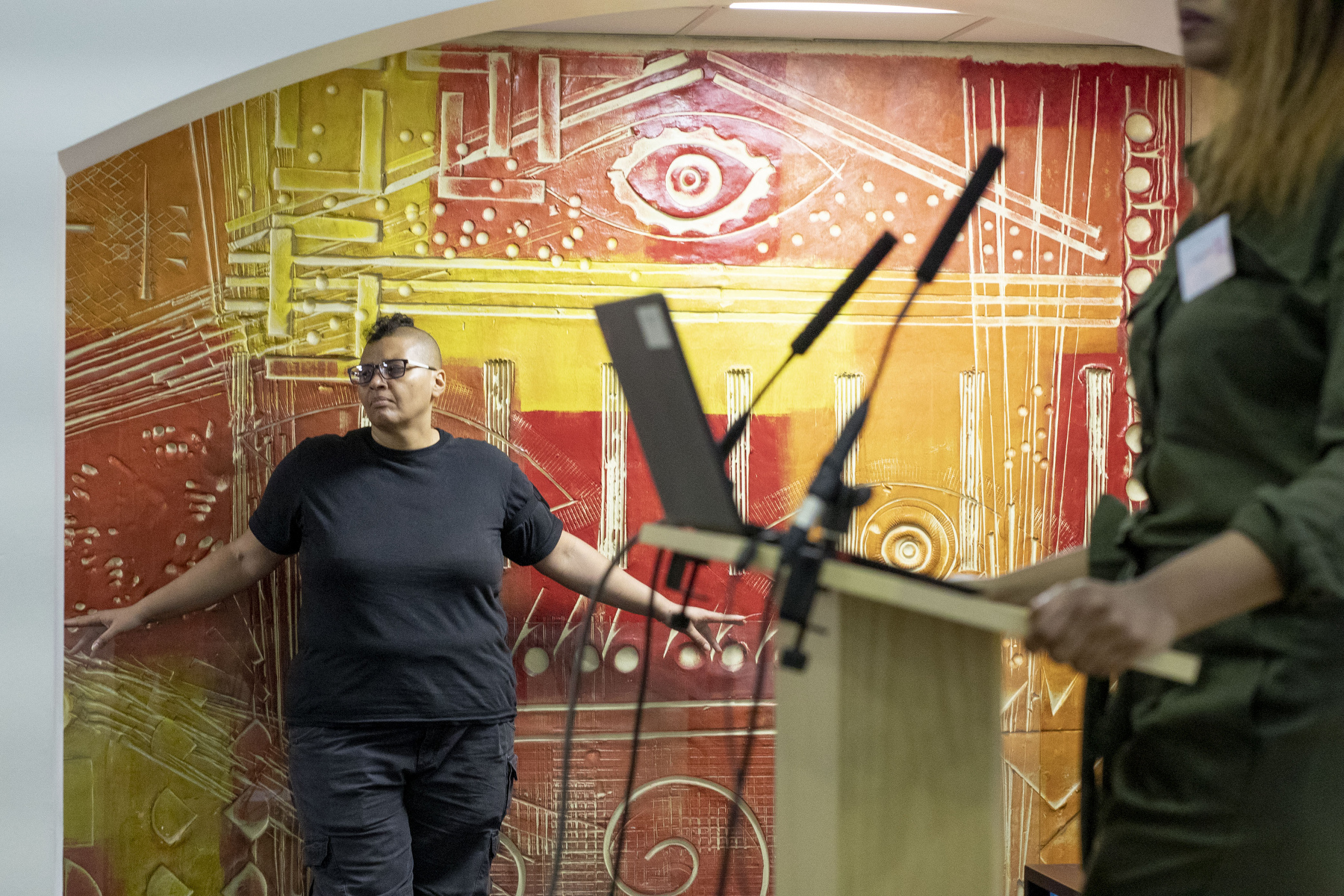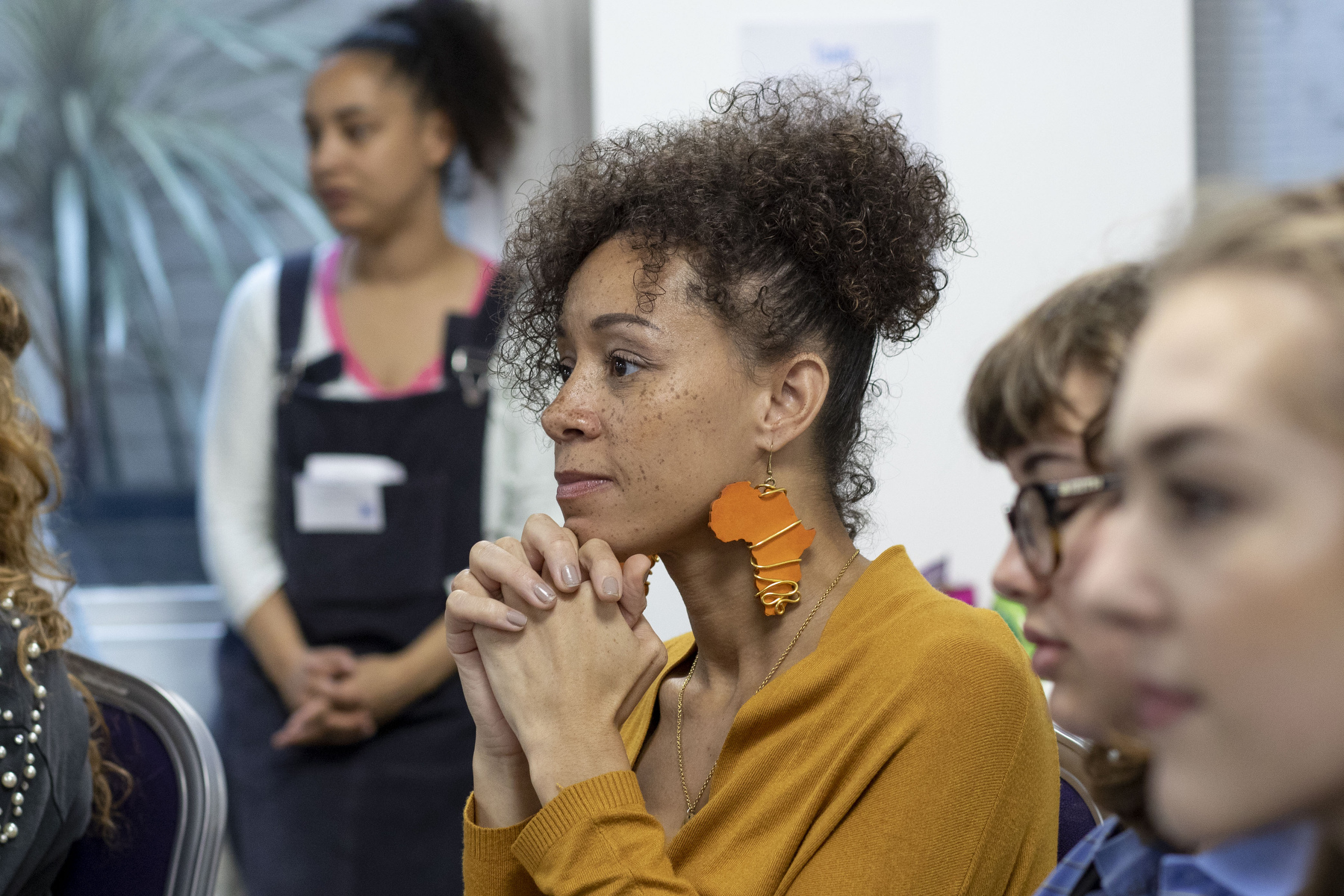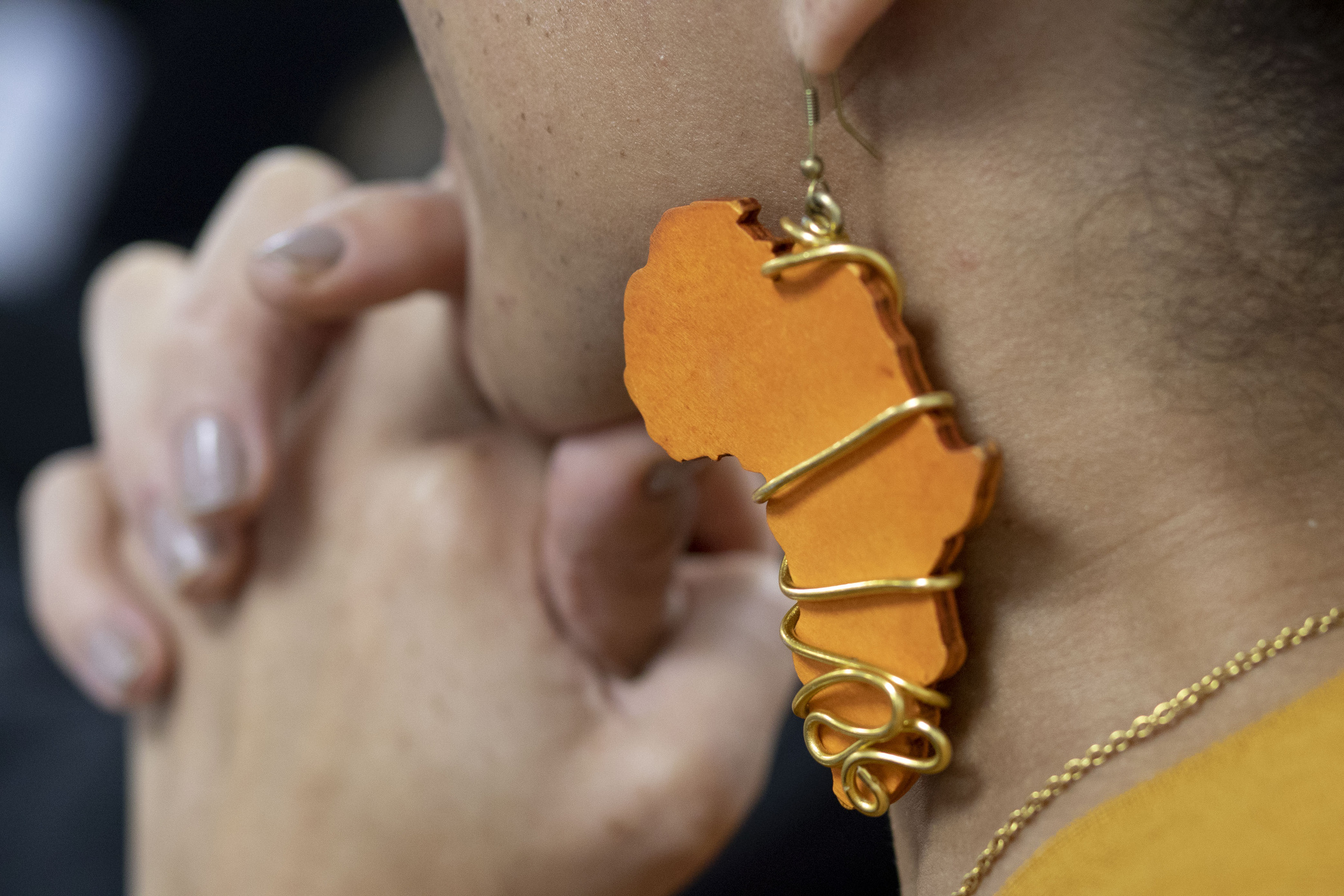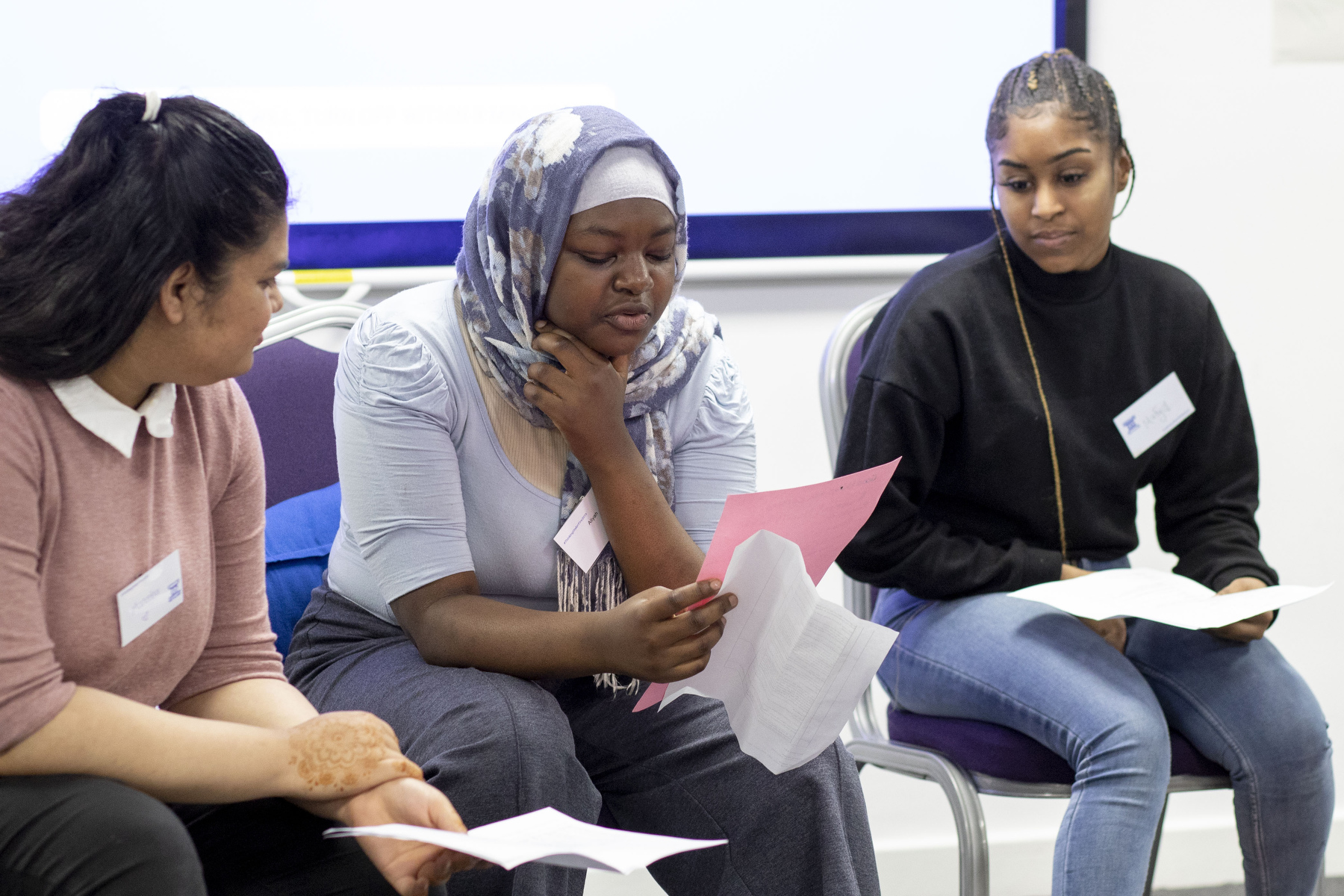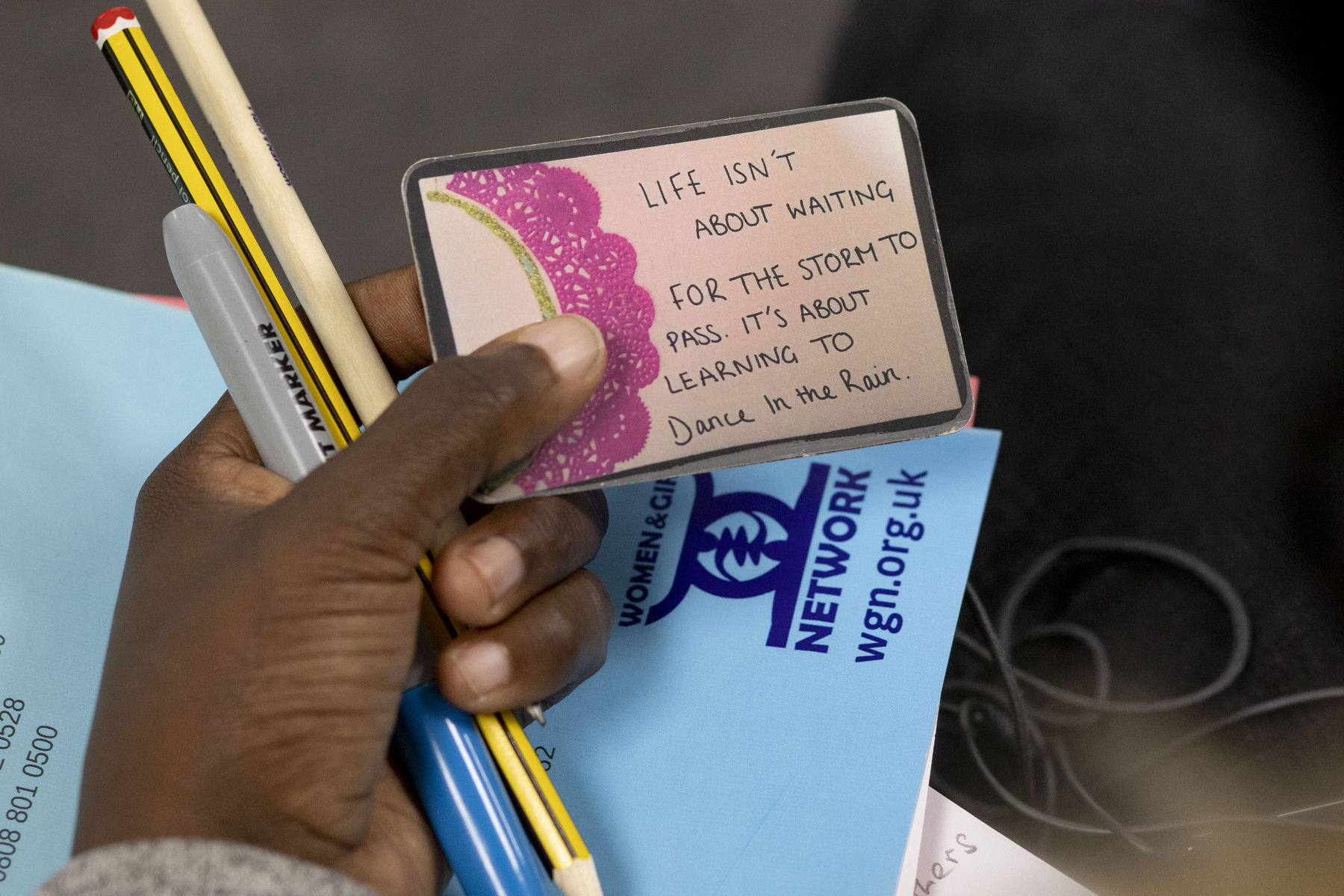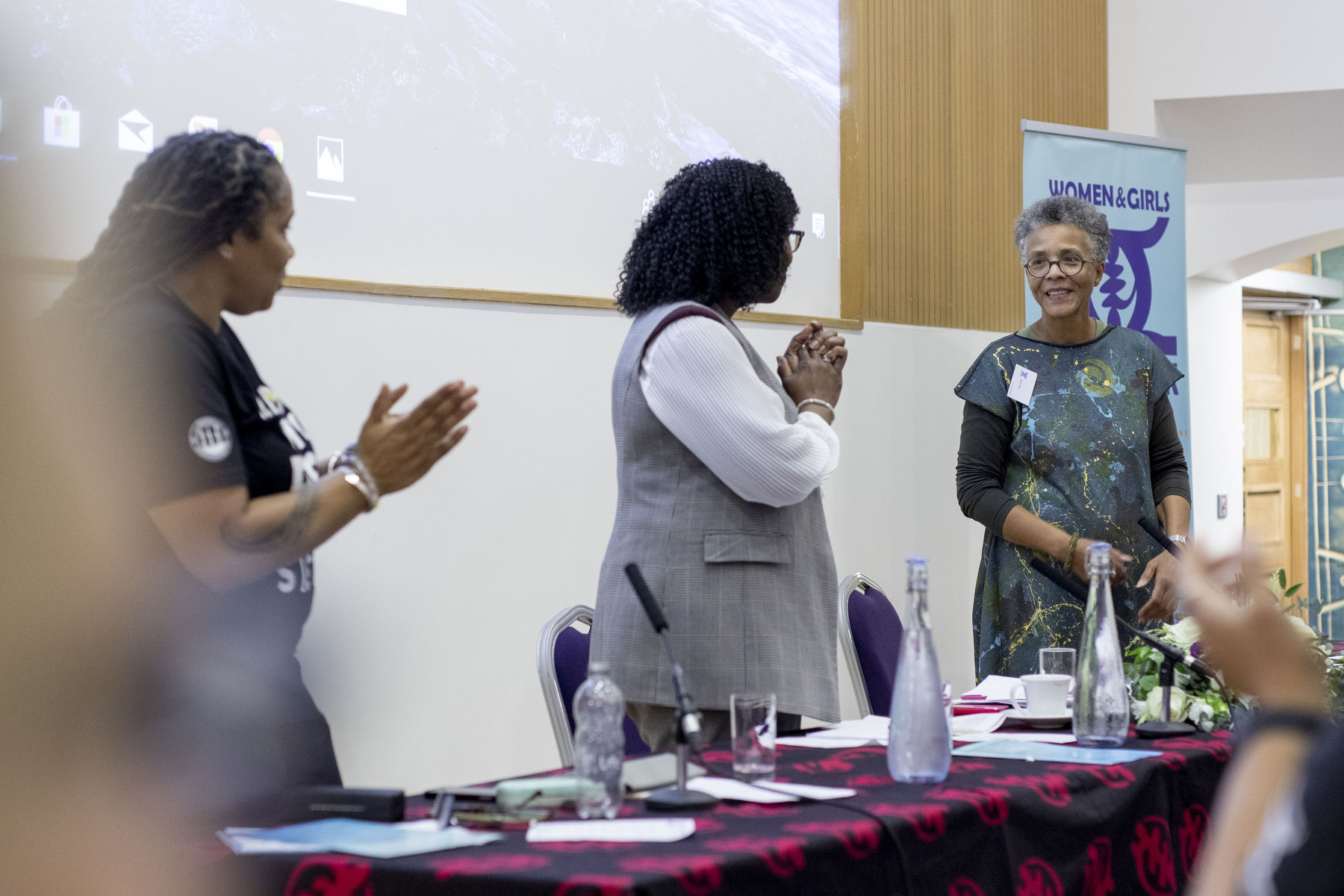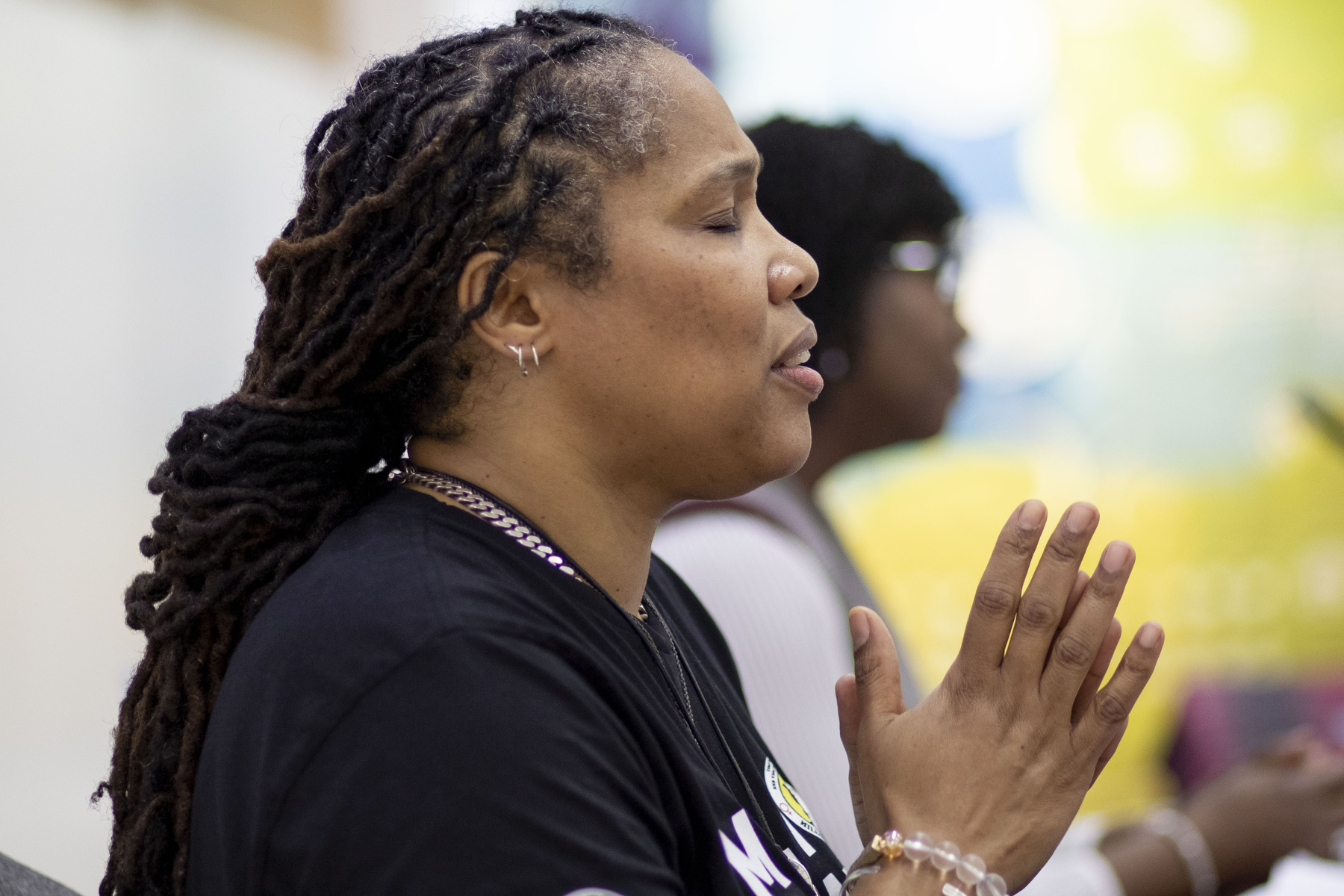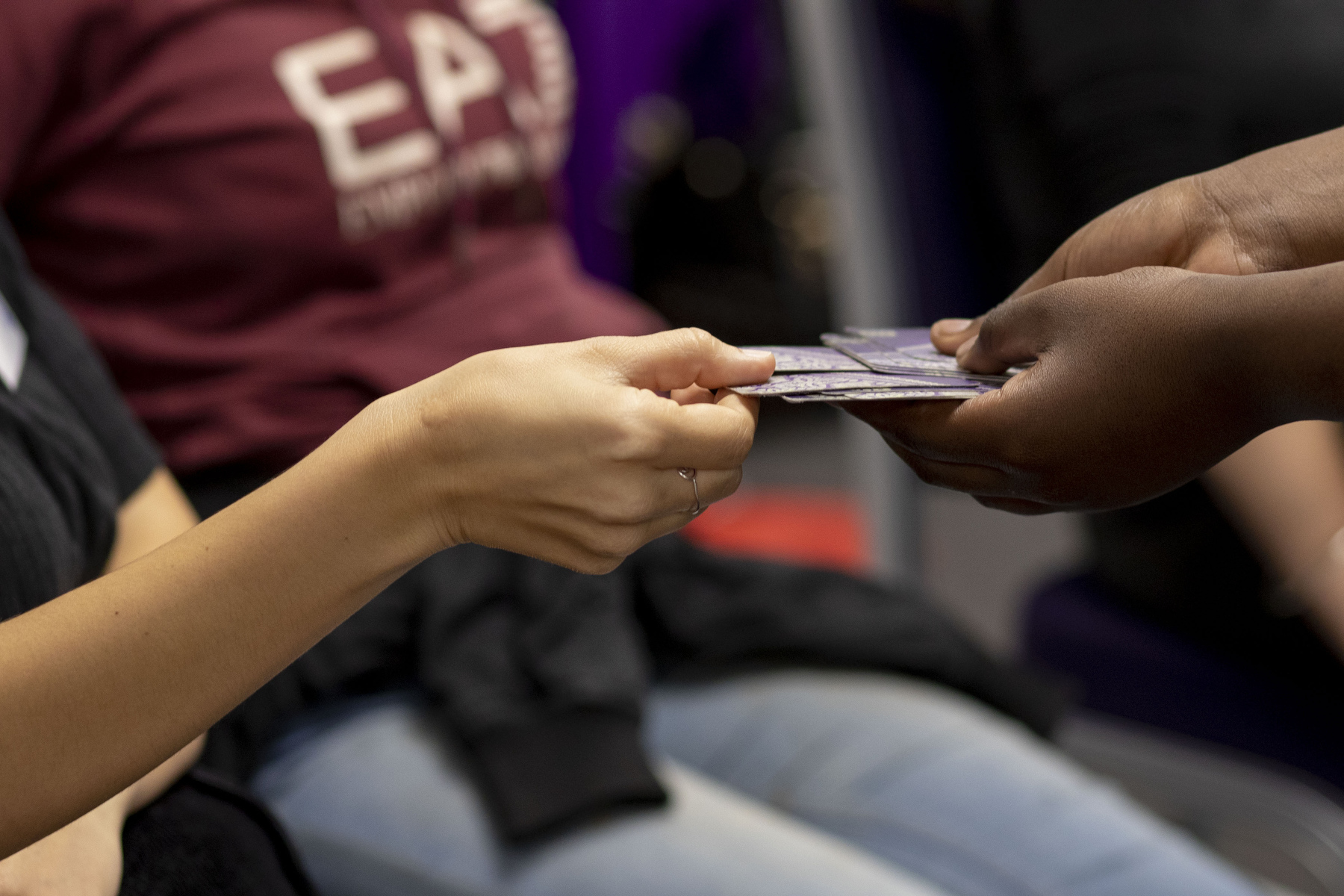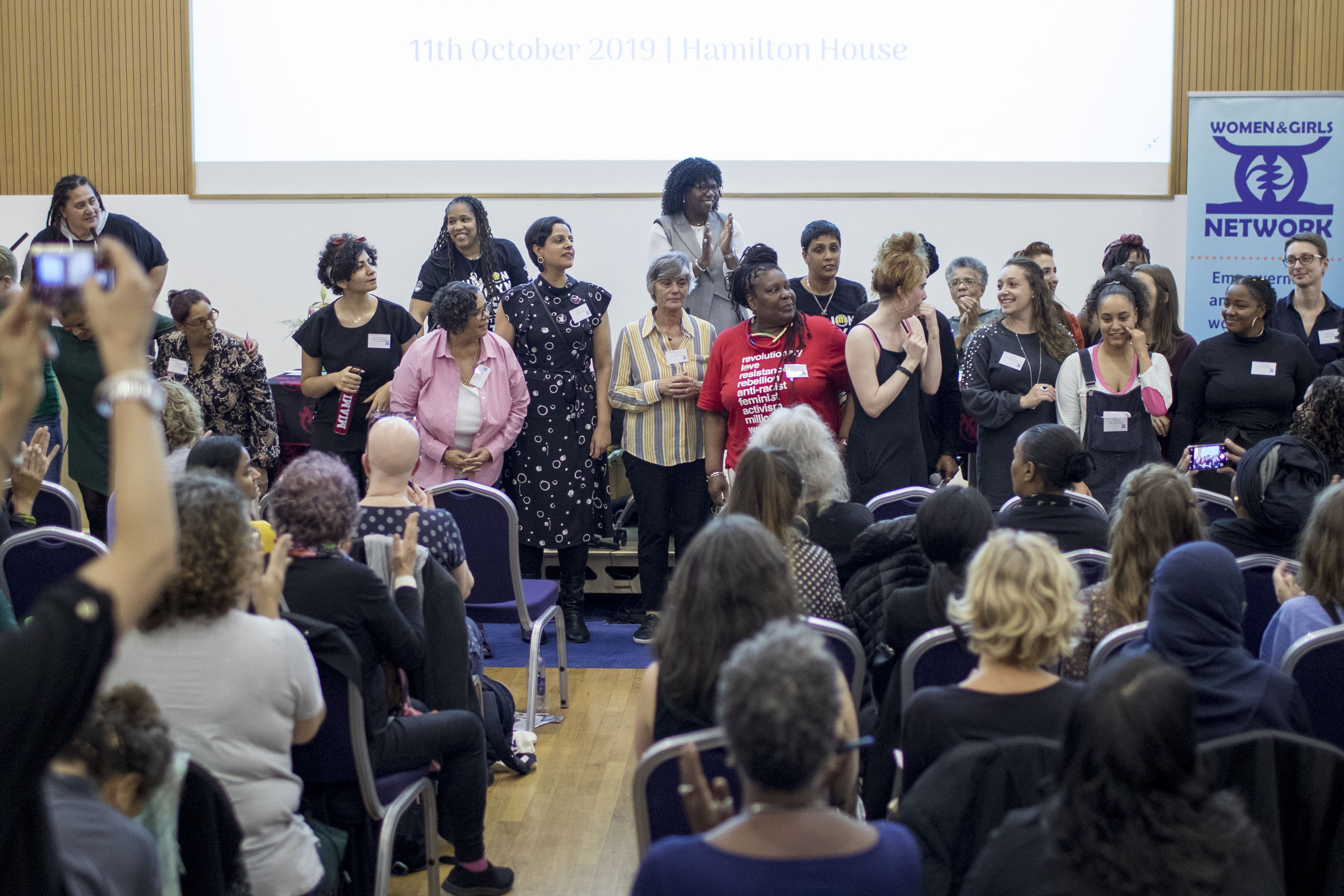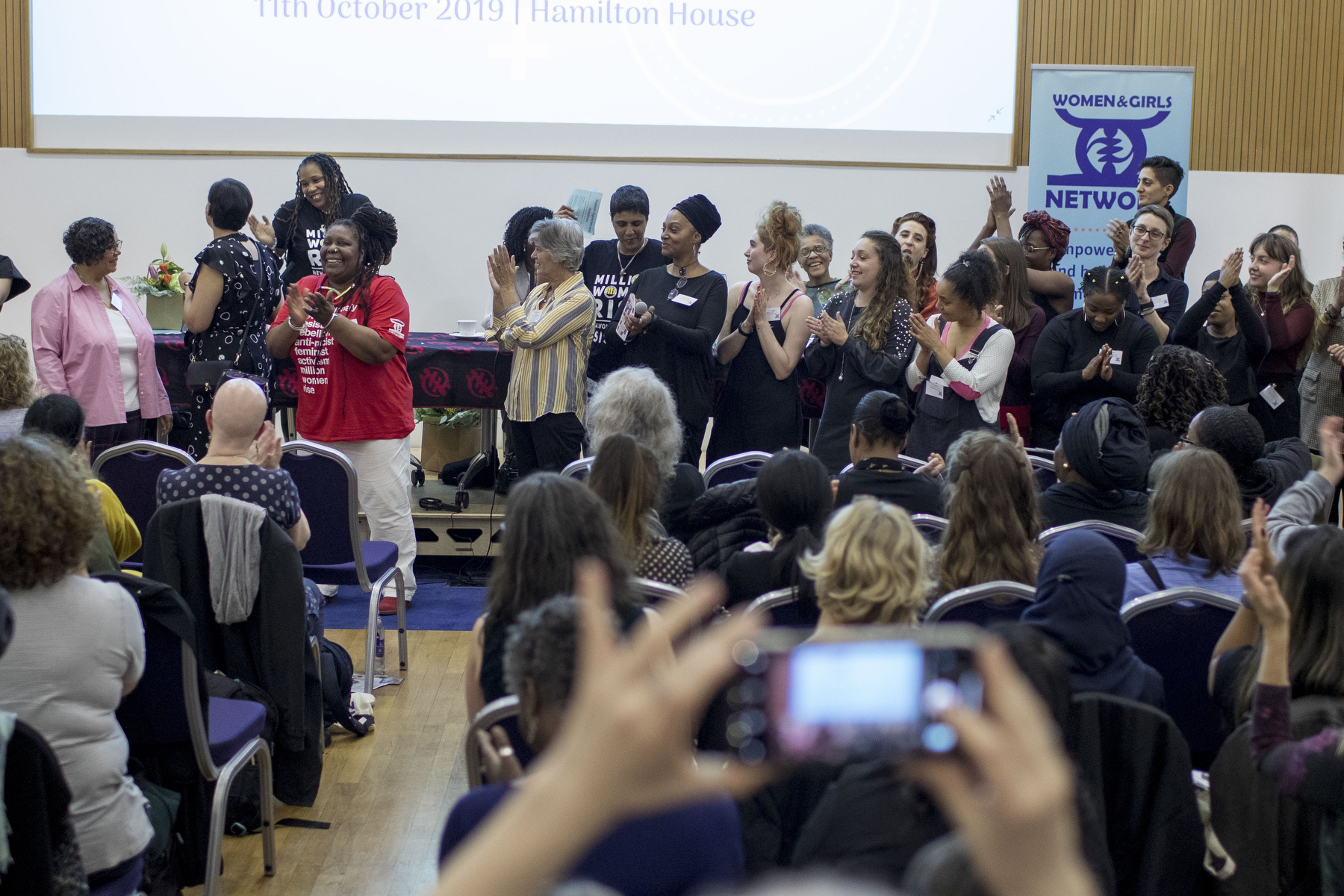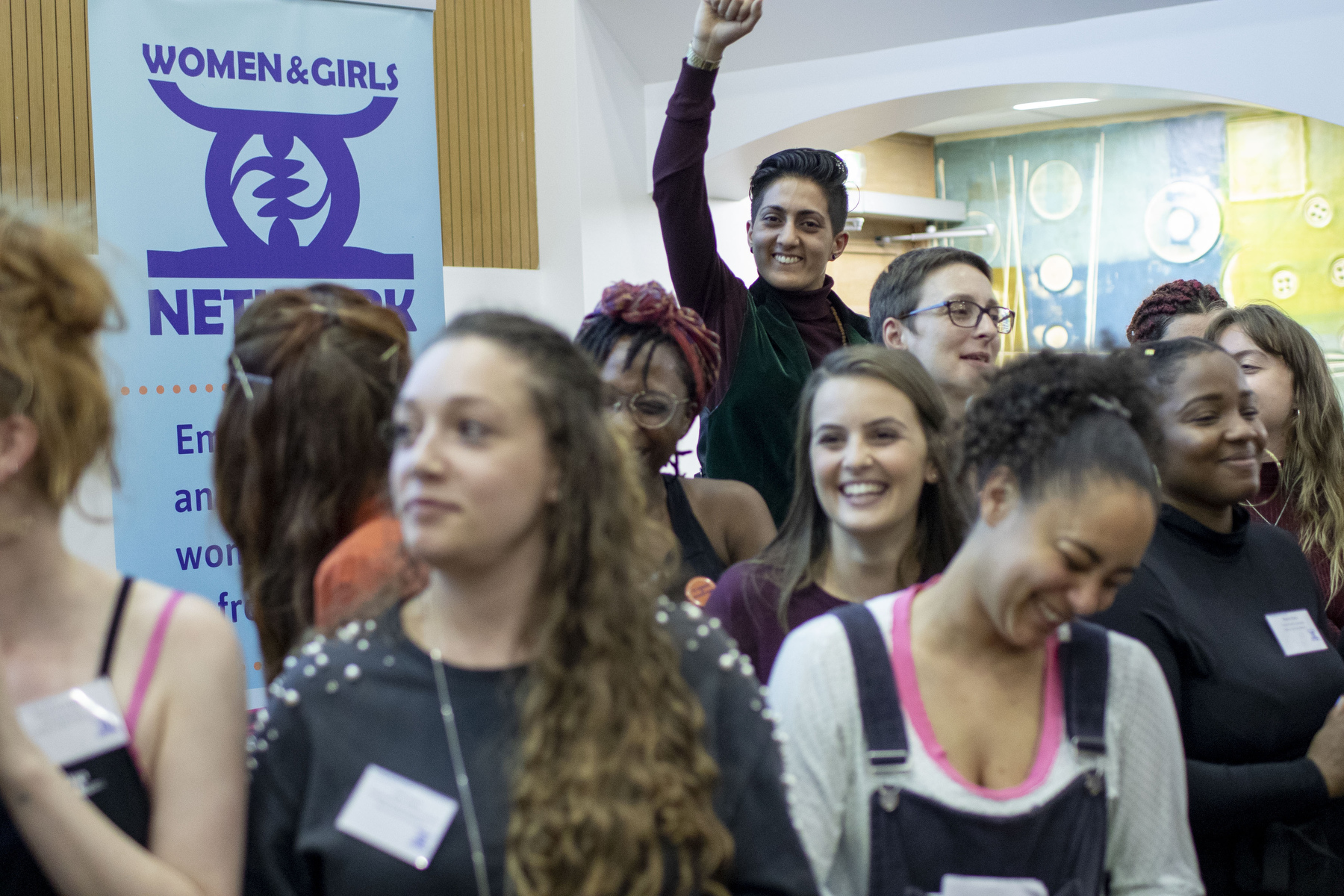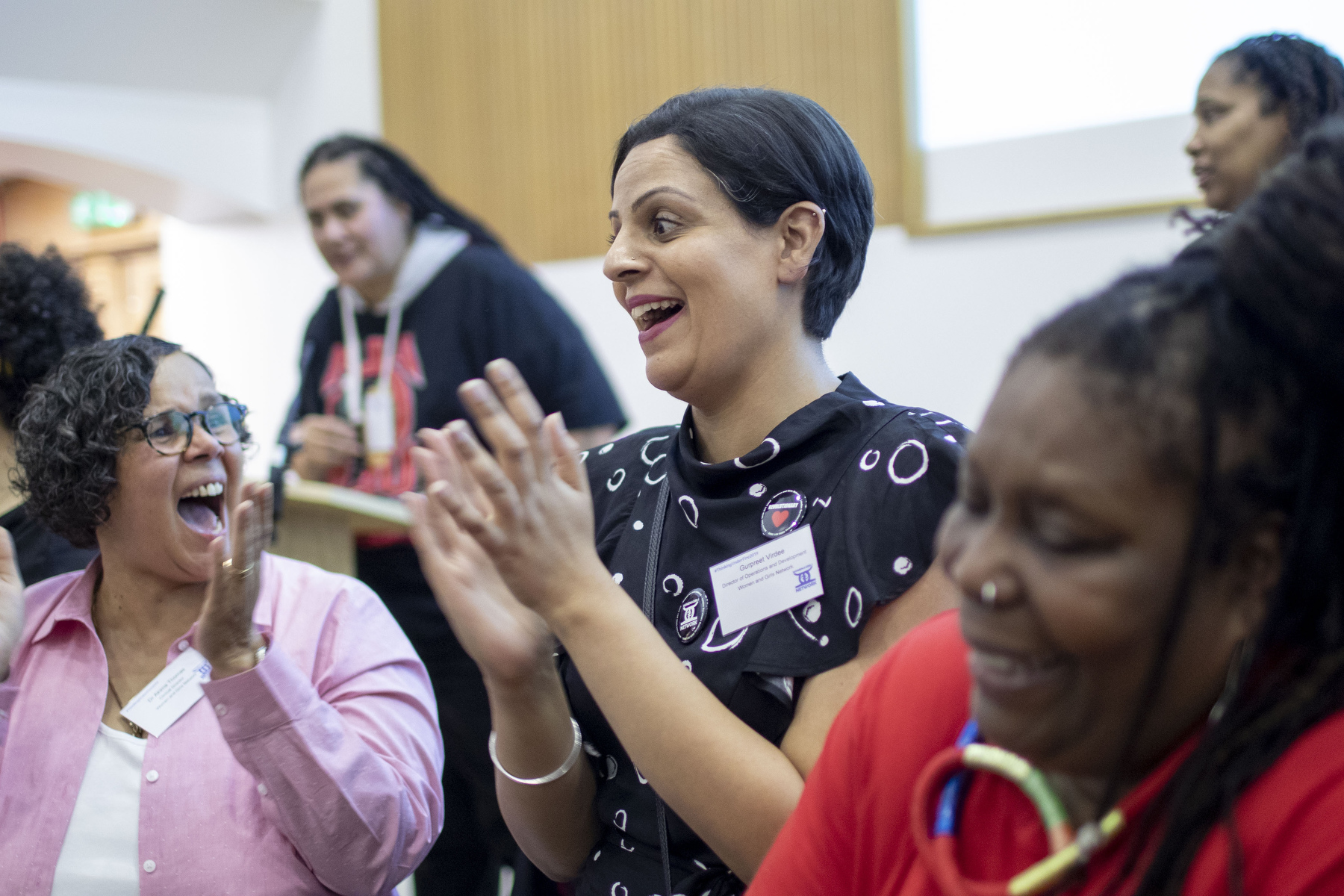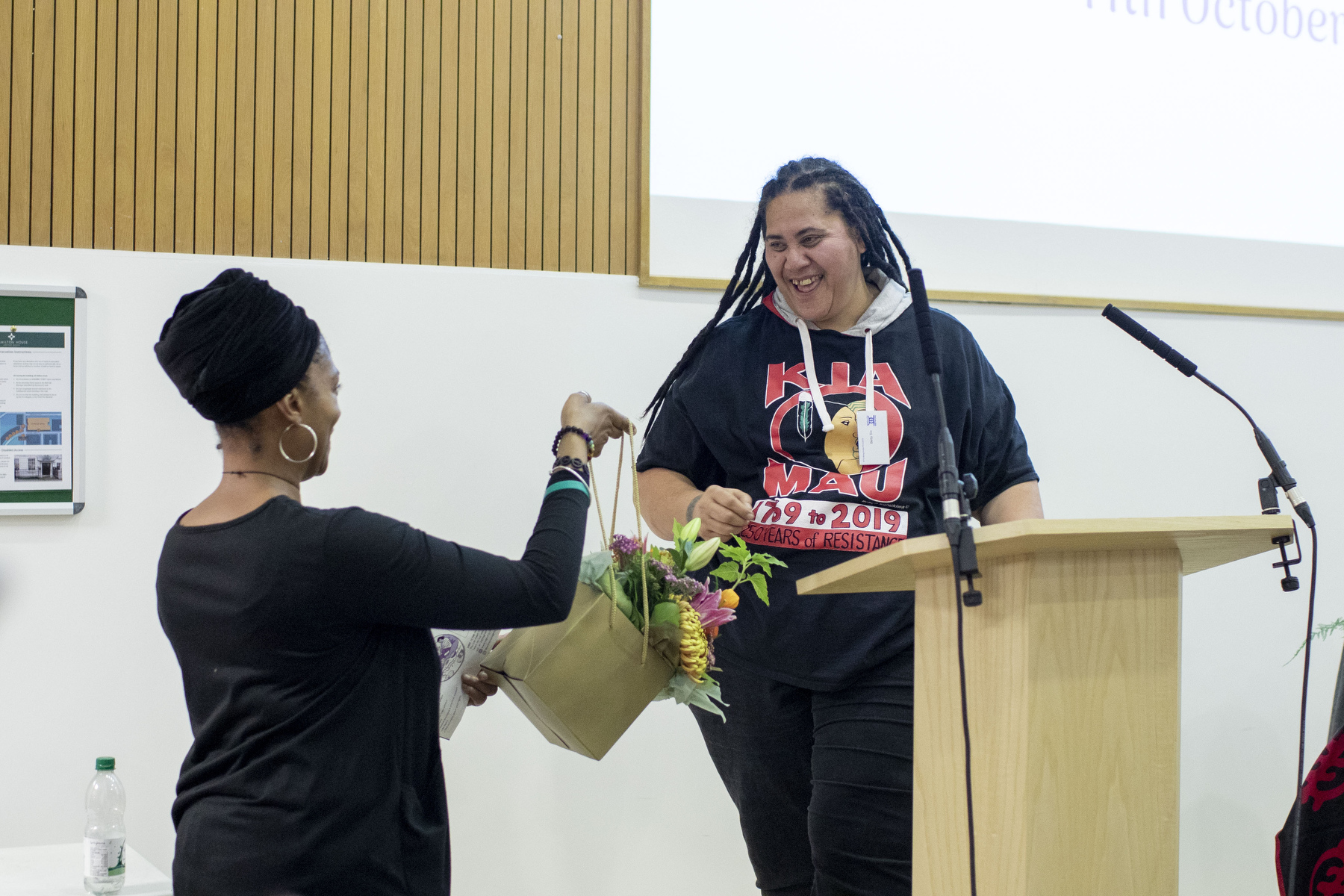Thinking Under Fire! WGN Conference 2019
Feminism, Intersectionality, and Trauma Informed Approaches
Thinking Under Fire! was the first conference organised by Women and Girls Network and was held on 11th October 2019.
The inspiration for the title of this conference came from the struggles that violence against women and girls organisations have been facing. Increasing demands for services, and commitment to provide quality resources and support, situates us in a constant struggle where we are thinking and responding under fire.
Thinking Under Fire! brought together practitioners, activists and survivors. We connected, reflected and learned from innovative speakers and facilitators drawn from the VAWG sector, Academia and women and girls with lived experience.
This is a call to challenge, critique and take ownership of concepts such as intersectionality, feminism and trauma informed approaches from the theoretical abstract to the practice and application.
In line with our ethos of Black Feminist leadership, the conference was led by black and minoritised women - bright stars of our future and wise elders of our present.
This report will show you a glimpse of the energy and joy that filled the day, through words and images.
The quotes included throughout this report are taken from feedback forms submitted by attendees, unless they are within the summaries of our keynote speakers, or stated otherwise.
I will always remember today. I want all feminist spaces to be lead like these.
Contents
- Artwork inspired by the event
- Speakers, facilitators and performers
- Photo gallery
- Feedback from attendees
- Learning points
- Closing remarks
All photographs on this page are © Vicki Couchman 2019
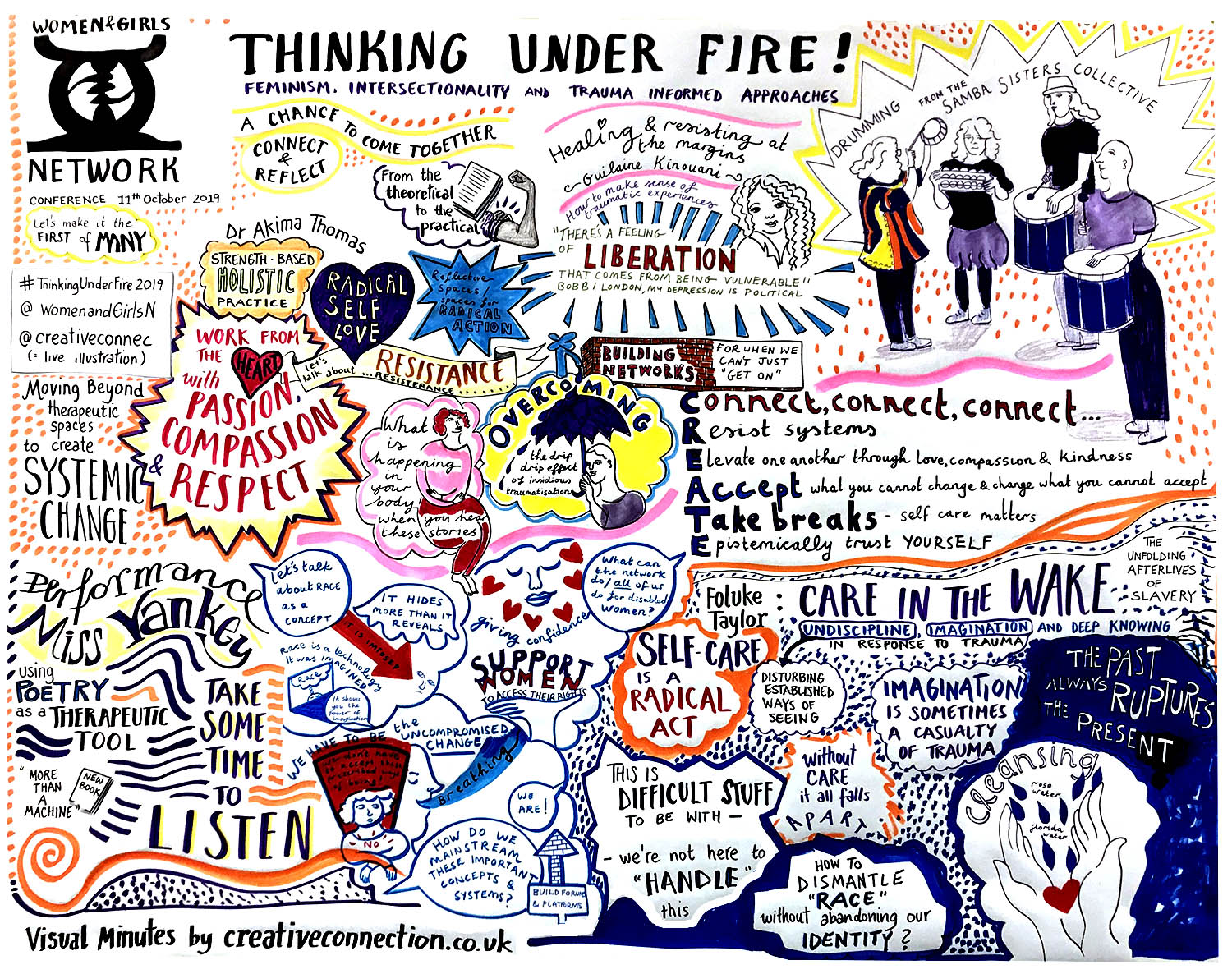
This incredible piece of art was created on the day of the conference by Creative Connections. The artists worked on the piece during the key note speeches and performances, capturing the essence of the day through imagery, quotes and colours. The day was so full of inspiration that the artists ended up creating two artworks, take a look at the second one here
Our Speakers, Facilitators and Performers
Thinking Under Fire! couldn't have happened without an incredible line up of women from across the worlds of academia, activism, front line work, art, poetry and music. Each woman brought her own perspective and experience, creating a truly intersectional feminist space. Click on their names to find out more.
Absolute powerhouse of women at the forefront of a movement I want to be a part of.
Femi Otitoju was Thinking Under Fire's wonderful chair, holding the space beautifully throughout the day. Femi is an equality and human rights activist, and is the Founder and Managing Director of Challenge Consultancy, an equality and diversity training and consultancy organisation.

Samba Sisters Collective opened the conference with a powerful drumming performance. Their bold sound filled the conference hall, and was the perfect start to an inspiring day.
The collective aim to empower women through drumming together. The band's feminist underpinnings extend to their bi-monthly rehearsals. Samba Sisters Collective is open to women and girls of all nations, ages and walks of life, including beginners.
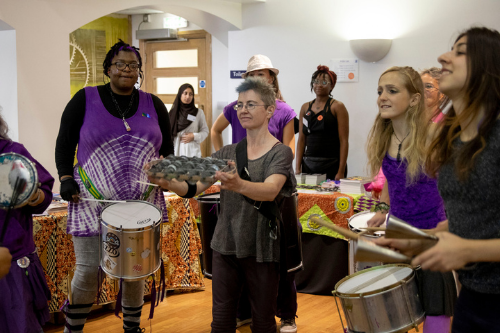
Survivors mobilise with courage, insight and tenacity to ensure they remain not just defended but defiant
Dr Akima Thomas OBE was the first speaker of the day, she is a black feminist activist and comes from a background in nursing, social work and psychotherapy.
Revolutionary love - born from fire, bravery, courage and commitment to all women and girls who are oppressed, standing alongside in solidarity.
One of the founders and Clinical Director of Women and Girls Network, Akima has pioneered working from a trauma informed approach and has developed a strengths based non-pathologising clinical model; the Holistic Empowerment Recovery Model (HER) integrating healing of mind body and spirit.
Women and Girls Network wanted to build a defiant house of healing and rage that created a new template refusing to see survivors as responsible or passive.
Akima has researched women’s healing journey chronicling their strategies of resistance, rebellion, and resilience to ensure survival and has a chapter in the book ‘Drop the Disorder’ which aims to challenge the culture of psychiatric diagnosis.
We should not just reduce the impact of violence to a range of distressing symptoms... there are hidden depths of grief... injuries that bruise the soul.

The wake is not only trauma, that would be a single story, there is also pleasure and joy.
Foluke Taylor was the second speaker in our line up, exploring deep thought and imagination as care for Black lives in the Wake of slavery.
When you breathe now, you are breathing for the people who came before you. Your survival is theirs.
Life-Rite-Writer, Word-World-Maker, Intergenerational-Generativity-Custodian, Counsellor, Psychotherapist, Writer and Teacher. Foluke explores the blended ‘fixing methodologies’ that are therapy, art and activism through engaging in transdisciplinary scholarship and practice. She holds an MSc in Creative Writing for Therapeutic Purposes and is currently teaching these practices on the Trauma Diploma at the NAOS Institute in London.
Imagination is sometimes a casualty of trauma, it’s not always a priority. Imagination is a route to the deep knowing that can support alternative meaning making.

I am no longer a victim, I am lucky for my life. So I wrote this for the women who in their story don't survive.
A British/Ghanaian writer and performance poet, Miss Yankey captivates people with her honest and heartfelt poetry which she often uses to advocate for the oppressed and silenced. An International Slam Champion, co-host and resident poet at The Chocolate Poetry Club, open mic host at Mind Over Matter, and member of London’s unrivalled FLO Poets, we were so lucky to experience a powerful performance of spoken word poetry by Miss Yankee as part of our line up.

Guilaine gave our third speech of the day, speaking about the various conceptualisations of trauma, and how intersectionality can further our understanding of the psychological consequences of oppression.
Guilaine is a feminist, an equality consultant, and a senior psychologist. She teaches critical psychology to undergraduates and holds a small private practice dedicated to the psychological needs and experiences of women of colour and other marginalised groups. She writes on the intersections on social injustice, oppression and mental health.
I am raising my voice so all the forgotten voices can be heard
Jaspreet Kaur, better known as Behind the Netra for her poetry, is an award-winning Spoken Word Poet from East London with an academic background in History and Gender Studies. We had the privilege of hearing a performance from Behind the Netra, as our second instalment of poetry at Thinking Under Fire.
Jaspreet has spent the last five years teaching History and Sociology in secondary schools across London, and her poetic works focus on themes such as gender inequality, mental health stigma and the postcolonial immigrant experience.
She actively works with national governments, corporations and charities alike, such as TED, the UN and women’s networks across the UK, using her poetry and writing to inspire and drive social change. Her TED talk, “How Poetry Saved My Life” is one of many examples of this. She is also an avid humanitarian and is an ambassador for Binti International and Time to Change.
In 2020, Jaspreet has been awarded the Ben Pimlott Writer in Residency at Birkbeck University as a Research Fellow with the Politics Department. She is currently working on her first book, a narrative non-fiction exploring what it means to be a Brown, British Feminist in this new decade.

Activists from Million Women Rise (MWR) held a workshop on the healing power of resistance.
MWR is a movement and annual march, led and organised by Black women for all women. We are united by outrage at the continued daily, hourly, minute-by-minute individual and institutionalised male violence enacted against women and girls worldwide. MWR strives to create a safe space where we resist racism, fascism, discrimination and hate whilst demanding an end to male violence in all its forms. One Woman, One Body, One Song, One Love.
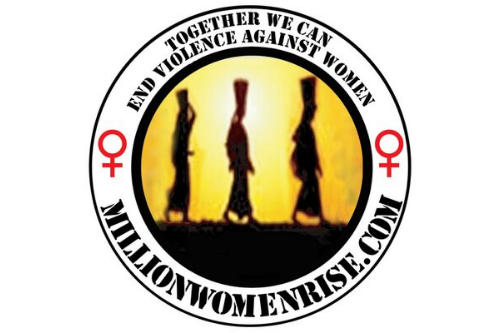
Dorrett Jones facilitated a workshop focusing on self care, asking how as Black Feminist survivors/practitioners, can we create spaces for retreat? Can we pause to consider ways we can lean-in to our own care as an antidote to the harm we absorb, within ‘our work’ and the context of a white supremacist heteronormative patriarchal system?
Dorett consults and educates on public speaking, women leadership and intersectionality, mental wellbeing and creative resistance. She previously practised as a psychodynamic counsellor, and worked in the violence against women and girls sector for over two decades.

A group of young women who work with WGN held a workshop on poetry, here they describe the space in their own words:
We came together and created a playful, safe, young women led space. We explored how creativity and poetry can be found anywhere and everywhere. We chose to share this workshop as we believe that in safe creative spaces there is space to heal ourselves and each other.
You’ll never really heal yourself if you’re not true to yourself - Anon, 18, London
Feedback from the session:
''Amazing! It was beautiful to see the young women create wonderful safe space. They were confident, eloquent, and warm. I hadn’t written poetry before and felt quite a lot of fear coming into the session. I left the workshop proud of my poem and inspired from meeting the young women leading the session. Thank you so much!''
''The atmosphere created was healing, radical and full of love. The young women were confident, grounded and held a room of 25+ women with grace, power and expert facilitation. I feel grateful to have been invited into the space and share my poem. HUGE 'f**k you' to the schools who kicked these young women out, the systems that have oppressed them and the adults who have ignored them. Look how bright their fire shines now. Love, solidarity and respect with them and for the young women's team who have/do support them.''

Anita has worked as a senior manager, trainer and consultant with a specialism in developing services to support those who have experience gendered violence. Her workshop focused on understanding trauma recovery as an act of social justice and empowerment. Critiquing the often over emphasis on individual resilience and capacity to deal and recover from trauma without questioning the necessary access and equity to social and economic resources/capital to recover, and reflecting on alternative models.

Speakers Corner Collective is a social political space run and led by women and girls aimed at making a difference and providing a platform for opportunity.
Their workshop explored the potential that is created when women and girls come together. They reflected on the achievements made, explored the challenges and barriers women and girls face when creating social spaces, being a young activist, and shared ideas and tips on creating your own social spaces and campaigns for change in your communities.
Winnie M Li held a workshop on the media’s portrayal of VAWG, and it's endless fascination with cases of sexual assault, abuse, the #MeToo movement. The workshop explored feelings and reactions to media portrayals of violence against women, examined how these feelings are tied to our own lived experiences, and looked at coping strategies to manage living in such an over-mediated world, while maintaining our own well-being and sense of truth.
Winnie M Li is an author, activist, and rape survivor. Her novel DARK CHAPTER won The Guardian’s Not The Booker Prize and is translated into twelve languages. She is a PhD researcher at the London School of Economics and Co-Founder of the Clear Lines Festival, addressing sexual assault and consent through the arts and discussion.
Liberation requires daily work... I have to engage in it because my life depends on it... It means speaking about devastation without defining ourselves as devastated
Marai Larasi is an advocate, activist and consultant who has worked in the area of ending violence against women and girls for 25 years. Her work has focused particularly on violence against minoritised / marginalised women and girls. Chaw Fyah Time focused on the importance of OUR fire.
Rage helped to free my ancestors from the plantation... Rage is critical!
Questions included in Marai's keynote speech were: Why intersectionality? What does solidarity look like in a context of professional feminism? How do we hold the embers and fan our feminist flames? How do we [re]claim our fierceness and utilise our rage?
Solidarity calls us into a messy community... It requires truth-telling... I’m exhausted by those who want to benefit from proximity to black folk, who want to see Black girl magic but not Black pain

Intersectionality is an example of us crafting an artefact for our toolkit of healing, and helps us see the forces that fragment us
Gail Lewis gave the final key note speech of the conference. Entitled Letter to Lucy/Our Daughters: Intersectionality, Fragmentation, Healing, Wholeness, the speech was written in the form of a letter to Lucy, WGN's training manager Michelle's daughter, who Gail connected with at an open day at Birkbeck, but also to all Black women and girls.
Never have we been in such a space where what we conjure, what we bring together for our healing, is not just our thoughts, mighty as those are, not just the description and declaration of our experiences, but actually our cultural productions through which we have been announcing our presence over and over and over again, right here in this room.
Gail was until recently Reader in Psychosocial Studies in the Department of Psychosocial Studies at Birkbeck College, and is a psychotherapist having trained at the Tavistock Clinic. She has worked at the Open University and Lancaster University. She was a long standing member of Brixton Black Women's Group and a co founder of the Organisation for Women of African and Asian Descent (OWAAD). She has been a member of the editorial collectives of the European Journal of Women's Studies and Feminist Review.
Healing from trauma involves knowing and feeling the difference between the past and the present, and putting the events of the past in the past. Not in a pretence that the events didn’t happen, but that somehow you survived them, and can minimise them by finding that source deep within you that offers a ‘despite’

The closing ceremony was held by Betty Sio.
Of Samoan heritage. Bestowed two Samoa chief titles. Born and raised in Aotearoa NZ. Black Lesbian Activist. Since 1983 Betty has worked within Pacific Islands communities addressing ending men’s violence against women and girls. Instrumental in the development of pacific islands women’s organisations and pacific islands health and social services in Aotearoa. Advocates and involved in fighting for the rights of indigenous peoples.
Betty's ceremony closed the day with song, powerful words, and a celebration of the women who spoke and performed. Finally, Betty called all WGN team members to the stage, in a beautiful ending to the day.

Today I've felt prouder than ever to call myself a feminist and a woman. We are Rising. We stand together.
Photo Gallery
We were very lucky to have Vicki Couchman photographing the conference. Her photographs have truly captured the essence of the day, they are powerful, beautiful, and full of joy. Take a look at some of the highlights below.
An event I will recall for so many more years. Songs, words and thoughts I will have taken into my mind and soul and will be channelled.
Feedback from Attendees
We were very grateful and humbled to receive glowing feedback from the women who attended Thinking Under Fire! We have taken a snap shot of the feedback we received to share with you:
97% of attendees said the conference met or exceeded their expectations.
91% of attendees said that what they learned from the event will impact on their work with survivors.
87% of attendees said that the event has increased their understanding and knowledge of VAWG and it’s impact.
88% of attendees said that they felt supported to attend the event
It’s a privilege to have been in this room and to have been able to listen to these fantastic speakers, surrounded by incredible women
What did attendees learn?
We asked our attendees to tell us what they learned about feminism, intersectionality and trauma informed approaches from being at Thinking Under Fire! Click on the terms below to read an overview of what they told us about each topic:
- We must reclaim the Blackness of intersectional feminism
- Gained a greater understanding of, and the need to educate ourselves on Black feminism
- Compassion over division
- How women’s histories affect the now
- The importance of undiscipline and rebellion together
- The impact of colonialism and racism on feminism
- Violence against minoritised women is political and power based
- Intersectionality is structural and political
- It existed before Kimberlé Crenshaw coined the term
- Race is a technology and asocial construct, and impacts on perceptions of the individual
- Eye opening for white women, seeing themselves as the oppressor and oppressed
- We must be more careful about using the term, it cannot lose its radical edge
- We must look at intersecting structures of oppression in relation to trauma
- Intersectionality is not what white man/people tell us, it is what we are, and is vital to understand our self
- Trauma is collective, constant, political and societal
- It is caused by structural and systemic inequality, not just individual incidents
- Criticism of clinical, medicalizing and pathologising models
- Moving towards holistic responses – self-care, resilience and well-being focused
Learning points for WGN
The feedback also provided us with valuable learning opportunities, and we recognise there is so much room to grow, especially as Thinking Under Fire! was WGN's first conference. When planning any conference in the future we will consider:
- Moving away from being London centric, black women's oppression is different in regional contexts
- Changing the start/end times to allow women to travel from further
- Providing notes on the content prior to event
- Making the goodie bags that attendees receive more environmentally friendly
- Opening up safe conversations about how we include our trans and non-binary siblings
Closing remarks
Thinking Under Fire celebrated 30 years of our work and our practice, it was like a coming of age. It was a confident, bold move - this is who we are, this is what we're about, and we're unapologetic. It was a really defining moment - Akima Thomas
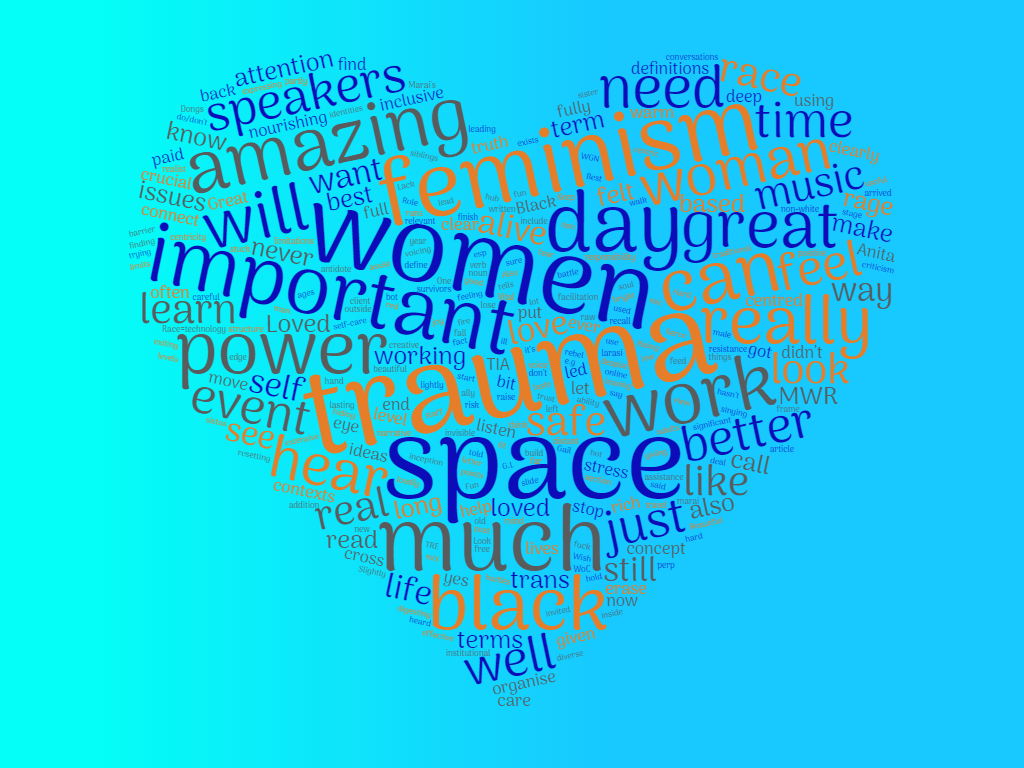
This image was generated from key words which appeared on attendees feedback forms.


